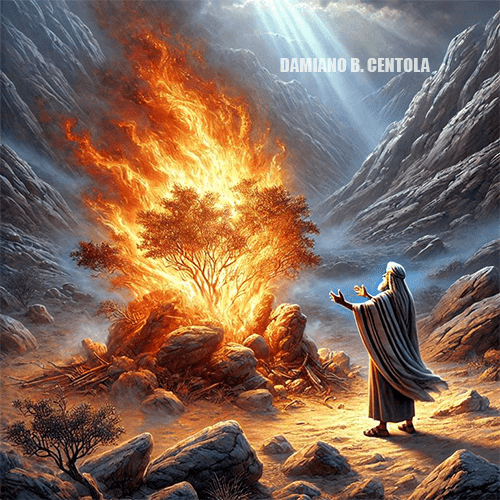Blog
- February 27, 2025
- Damiano B. Centola

“The Flame That Speaks: Moses and the Voice of 'I AM' ”
When Moses encountered God at the burning bush, he was standing on holy ground, a place where the ordinary met the extraordinary. Amidst the flickering flames of a bush that did not burn, God called out to Moses with a command to deliver the Israelites from their bondage in Egypt. Understandably, Moses was overwhelmed and asked God, “Who shall I say sent me?” God’s response was striking in its simplicity and profundity: “I AM WHO I AM” (Exodus 3:14).
This was the moment God revealed His divine name—“I AM.” These two words are packed with significance. In saying “I AM,” God wasn’t just giving Moses a name; He was revealing the very essence of His identity. He was stating that He is self-existent, eternal, and unchanging. He was showing that His nature is not bound by time, space, or circumstance. The name “I AM” speaks to God’s infinite nature, His power, and His complete independence from anything or anyone.
But what does this mean for us today? How can we, like Moses, approach the God who is “I AM”? How can understanding this profound revelation change the way we live, pray, and walk with Him? Let’s explore the depths of this name and what it reveals about the God who calls us to know Him intimately.
God’s Self-Sufficiency: The Source of All Life
At its core, the name “I AM” reveals God’s absolute self-sufficiency. God depends on nothing and no one. He exists because He exists. This is what theologians call God’s “aseity”—His self-existence. Unlike every created thing, which relies on external factors to exist (air, water, food, etc.), God is completely independent. He is the source of all life, yet He Himself needs nothing.
Exodus 3:14 encapsulates this truth: “I AM WHO I AM.” This statement underscores God’s eternal nature, His self-existence, and His independence. He is the source of everything, the creator of the universe, yet He stands outside of it, unbound by the laws of nature or the limits of time. God is not subject to decay, change, or need—He is complete in Himself.
For us, this means that when we come to God, we are not approaching someone who is distant or detached. We are approaching the very source of all life. Our prayers are directed to the One who has no lack, no limitation, and no weakness. And because God is self-sufficient, He is able to meet our every need without ever diminishing who He is.
Reflection: What does it mean to trust in a God who is fully self-sufficient? It means we can come to Him knowing that He will always be enough for us. He never tires, never runs out of resources, and never changes His mind. His provision, protection, and presence are constant because His nature is constant.

Books Available

Divine Encounters: Discovering the Depth and Power of God's Names

The Lord Is My Shepherd: A Journey Through Psalm 23; Meditations on Trust, Hope, and Eternal Love

The Mother of Corruption: Unveiling Spiritual Corruption from Babylon to Today

I Choose the Call: My Daily Anthem of Devotion

